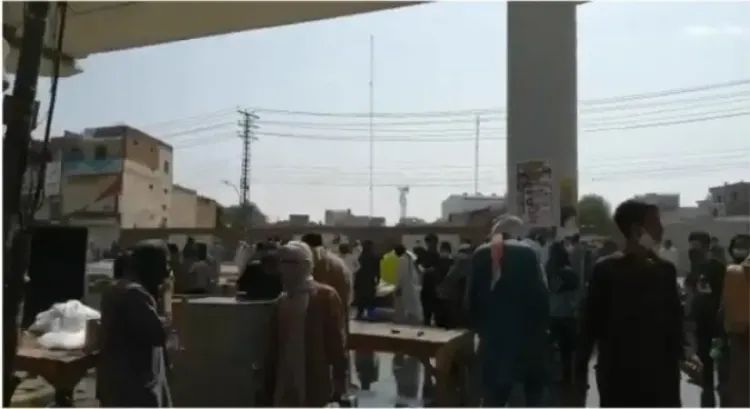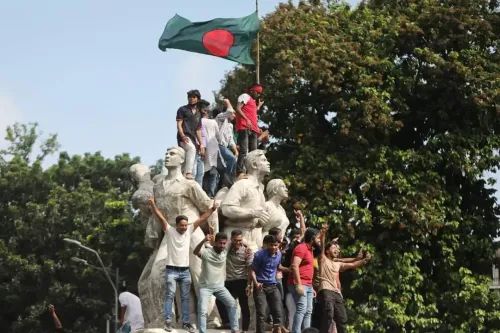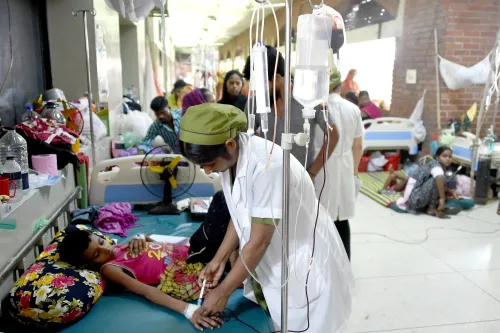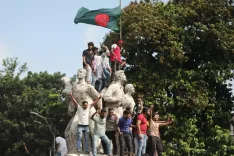Has Pakistan's Muridke Incident Exposed a Regime Trading Blood for Approval?

Synopsis
Key Takeaways
- Muridke massacre reveals systematic state violence.
- The regime prioritizes foreign approval over citizen safety.
- State repression is now a tool of foreign policy.
- The military's role in domestic oppression raises concerns.
- International legitimacy is sought at the cost of human lives.
Islamabad, Nov 9 (NationPress) The Muridke massacre, which took place over three weeks ago, has quickly faded into obscurity, much like other heinous acts in Pakistan’s contemporary history. However, it serves as a template for a regime that has discovered how to exchange blood for approval. This regime has not only deceived its citizens but has also incorporated repression into its foreign policy, as highlighted in a report.
No independent investigation, no accountability, and no outrage—just another failure on the national stage, buried beneath state propaganda and foreign policy theatrics. The incident at Muridke was not a spontaneous confrontation but rather a premeditated operation. Umer Azad, a software engineer and volunteer with CODEPINK and the Palestinian Youth Movement (PYM), detailed this in a report for CODEPINK.
According to DropSite News, protesters from the Tehreek-e-Labbaik Pakistan (TLP) assembled to oppose Pakistan’s potential normalization with Israel and to express solidarity with Gaza. As reported by Dawn, over 10,000 law enforcement personnel participated in a 'cordon-and-search operation' in Muridke, with units from the Frontier Corps and Pakistan Rangers arriving on a special train from Rawalpindi. Law enforcement utilized surveillance drones to map out streets and neighborhoods, while trenches were dug along main thoroughfares in preparation for the operation. The forces advanced in the early morning hours, opening fire on the crowd that had gathered peacefully. Eyewitness accounts and social media footage revealed heavy gunfire and chaos, resulting in numerous fatalities and injuries. By dawn, the streets were strewn with spent cartridges and blood, and the air was thick with tear gas. Among the harrowing footage circulating on social media, one clip stands out, showing security personnel firing incessantly into crowds of unarmed demonstrators,” the CODEPINK report stated.
Similar scenes unfolded in Pakistan in 2024 when thousands of Pakistan Tehreek-e-Insaf (PTI) supporters rallied against the imprisonment of party founder Imran Khan. In reaction to these protests, Pakistani authorities imposed a nationwide communication blackout, resulting in dozens of deaths, hundreds of injuries, and thousands of detentions.
Both incidents illustrate a pattern that can no longer be dismissed as “excessive force” but rather as “systematic state violence: deliberate, rehearsed, and rewarded,” according to the report. The reward was immediate in the case of Muridke, as reports emerged shortly thereafter suggesting that Pakistan’s military establishment was engaged in advanced discussions with the United States and Israel, facilitated by the CIA and Mossad, to deploy up to 20,000 Pakistani troops to Gaza as part of a so-called peacekeeping initiative.
A report from CODEPINK stated: “In this context, the Muridke massacre appears less like domestic repression and more like a display of capability, a live-fire demonstration meant to show Washington and Tel Aviv how effectively Pakistan’s generals can suppress dissent, whether in Punjab or Palestine. This is what Pakistan’s pursuit of Western validation now costs: blood for legitimacy. A regime that opens fire on its citizens for waving the Palestinian flag is now branding itself as a stabilizing force in Gaza. The same commanders who unleashed bullets on protesters in Muridke will soon wear peacekeeping insignia, celebrated abroad as partners in regional security.”
According to the report, the Pakistani military has, in the past three years, overthrown an elected government, incarcerated political opponents, including Imran Khan, on fabricated charges, carried out an election marred by extensive electoral fraud, as confirmed by the Commonwealth Observer Group, and persecuted journalists, forcing many into exile. The judiciary has been stripped of independence and regularly faces threats from state actors while individuals are tried in military courts, violating the International Covenant on Civil and Political Rights (ICCPR).
A CODEPINK report concluded: “Muridke serves as a blueprint for a regime that has learned to trade blood for approval. The current administration has not only betrayed its populace but has also institutionalized repression as a tool of foreign policy. The generals have realized that the path to Washington and Tel Aviv runs through the corpses of their own citizens. In Muridke, they provided the ultimate demonstration of how rapidly and brutally dissent can be quelled in the name of order.”









